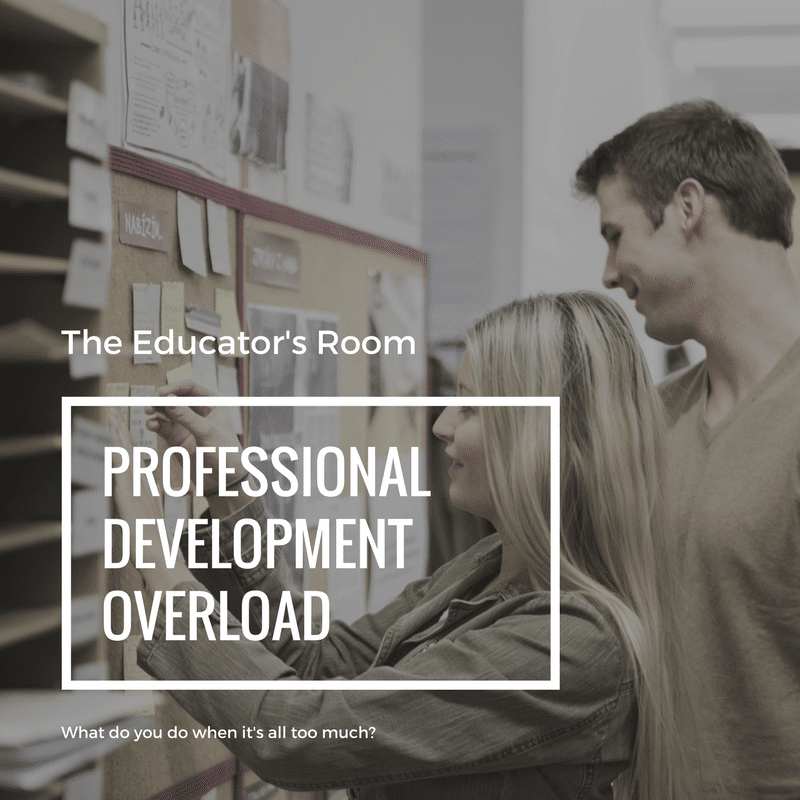I love conferences. I always have, and now that I’m working in education, I love them even more. My background is in history and archaeology, so there was always a lot of them. You would prepare research, or just go and listen to what other people in the field were doing. Plus, it was always a great time to catch up with old friends who worked far away! Yup. Professional development was the best.
Now that I’m working in education, I still enjoy professional development. I get to go and listen to awesome strategies to make my teaching more effective, to help me reach more students. I also get to see other professionals in my district, like the awesome elementary teachers. It’s a wonderful few days of listening and learning.
Professional development usually comes in conference or workshop form, which is great. I attended a three-day workshop and really enjoyed the days where I was totally immersed in learning about how to be a more effective educator. But I noticed something. No matter how interesting and helpful I found the content I was learning about, by the last day my brain stopped taking in information.
There was just so much being thrown at me, and not enough time to process it all. There was no shortage of strategies that I wanted to try in my own classroom, but halfway through that last day, nothing was sticking. My brain was struggling to keep up, and I felt overwhelmed.
I call this “professional development overload.” It’s that moment where you realize that your brain can’t absorb anything else. There is just so much new information being given to you that you need a day to process it. The weekend after I got home from the conference this summer, I went to my classroom and sat at my desk, processing and visualizing how things could work.
At my conference this summer, I had to think of a way to save as much information as possible without relying on my brain to remember it. The last few days, I started writing down everything, so that I could go back and look at it later. I talked with my carpool, reread my notes, and thought about the conference for a few days. But at the conference itself, there was no way that any more information could have fit into my brain.
Of course, it could just be me as a new teacher. Maybe teachers who have been teaching for a few years don’t sit there on the last day of the conference with the feeling that their brains have officially logged out? Maybe, because they already know so much, they don’t get the same feeling of informational overload? And maybe it’s just true that sometimes we try to do too much during our professional development time, leading to a sense of overwhelmed teacher-brain.
I asked around, and other teachers were wandering around in a professional development overload haze, trying to remember all the valuable information but feeling a little overwhelmed with the sheer volume of what we were learning. Is this final day still useful, if no one is able to remember it? Or is the final day of note-taking and listening still just as valuable? I’m still not sure.
Maybe we need to structure professional development a little differently, offer more time to think on and absorb lessons. Perhaps we’re all just so excited to learn that we try to cram too much into a short period of time. (Teachers trying to do too much because we’re excited; yeah, that makes sense).
What is the answer? I’m not sure, but this leads me to an interesting thought. Remembering the feeling of my usually trusted brain turning to mush, I imagined what information overload about something I’m not passionate about would feel like. As a result, I was very careful with how I structured my classes this year. My hope is that my students never feel their brain’s becoming overwhelmed in my classroom. At least not to the point where they shut down!
This isn’t me saying that professional development isn’t important. It’s incredibly important. Sometimes, though, it feels like there’s just too much happening. There’s always so much to learn. Our field is always growing and changing, and we need to grow and change with it. Professional development gives us the chance to do that. It also helps us connect with our colleagues. But that last day feels so much less helpful to me. There was so much that I learned the other days. Is there a way to make that information feel less overwhelming? Or is it better to just take all the notes we can and hope for the best?
Does anyone else ever feel like they’ve had professional development overload? How do you cope with it, so that you still get the most out of your professional development experience?





